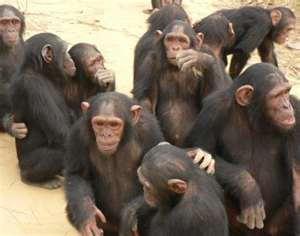In the animal kingdom the ape is a close resemblance to man.
But per DNA study done by scientists among the apes, it is not the gorilla but the chimpanzee is the closest relative to man.
New research has shown that in a chimpanzee community there are jungle enforcers policing their ranks and responsible maintaining peace and order.
They may not carry sidearms nor handcuffs in the performance of their duty, but chimpanzees engage in impartial ‘policing’ of conflict, according to anthropologists from the University of Zurich, led by Professor Carel van Schaik and Claudia Rudolf von Rohr.
They reveal that chimpanzees mediate conflicts between other group members not for their own direct benefit, but to preserve the peace and stability within the group.
Chimpanzees deploy policemen to keep the peace, according to a new study and the author suggests that this behavior can be regarded as an early evolutionary form of morality.
Until now, this morally motivated behavior in chimpanzees was only ever documented anecdotally.
However, the new study now confirms that chimpanzees intervene impartially in a conflict to guarantee the stability of their group, exhibiting pro-social behavior based on an interest in community concern.
Hierarchy is also being observed in the chimp community. It’s the high-ranking chimps that intervene as jungle policemen
This policing activity was rare and generally limited to high-ranking individuals.
The researchers also found that the arbiters were more willing to intervene impartially if several quarrelers were involved in a dispute, probably because such conflicts are more likely to jeopardize group peace.
‘The interest in community concern that is highly developed in us humans and forms the basis for our moral behavior is deeply rooted. It can also be observed in our closest relatives,’ concludes Rudolf von Rohr.
